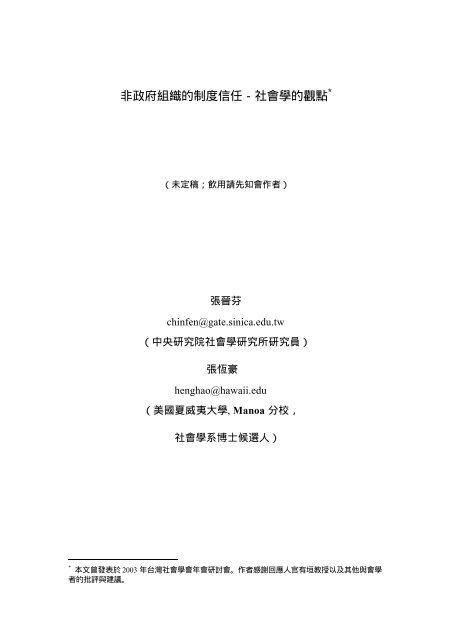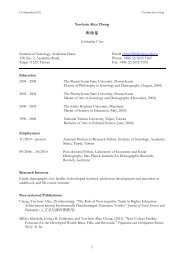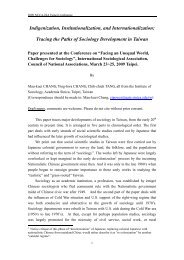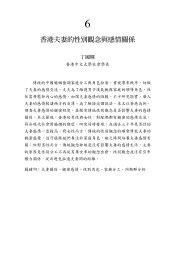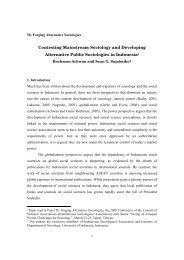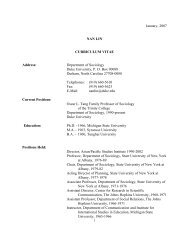全文 - 中央研究院-- 社會學研究所- Academia Sinica
全文 - 中央研究院-- 社會學研究所- Academia Sinica
全文 - 中央研究院-- 社會學研究所- Academia Sinica
- No tags were found...
You also want an ePaper? Increase the reach of your titles
YUMPU automatically turns print PDFs into web optimized ePapers that Google loves.
Institutional Trust of Taiwanese Non-Government Organizations---A Sociological PerspectiveChin-fen Chang (Research Fellow, Institute of Sociology, <strong>Academia</strong> <strong>Sinica</strong>) andHeng-Hao Chang (Ph.D. Candidate, Department of Sociology, University ofHawaii---Manoa)AbstractIn theory, the competence of private enterprises may be tested by marketcompetition, while that of the state can be improved by elections or legislativemechanism. As to non-government organizations (NGOs), as a check-and-balance ofthe power of both the state and the market, should it be monitored too and how couldit be done? This paper argues that, most NGOs obtain their financial resources fromthe state’s subsidies or tax exemptions, or from private donations, and the foundationof the legitimacy is based on their altruistic nature, the establishment of institutionaltrust by NGOs is necessary to legitimize the existence of NGOs and the vitality of acivil society. The bases of international trust of NGOs rely not simply on individual ororganizational performance, but on the existence of monitory and sanctioningmechanisms. In addition to theoretically specifying the association betweeninstitutional trust of NGOs and the accumulation of social capital as well as theconsolidation of civic society and democratization, this paper empirically tests thelevel of institutional trust of three well-known Taiwan NGOs. We generally find thatthe three NGOs are deficient in terms of accessibility and transparency of theirmonitoring and sanctioning mechanisms, which are the bases of institutional trust.Keywords: non-government organizations, social movement organizations,institutional trust, social capital, civil society.
… … 2003 9 18 1 1999a3-42 11 Civil society civil society city state 2003civil society2000 civil society (complement) (check and balance) civil society civil society 2 accountability (2002)( 2000) accountability 1
23(monitoring) (sanctioning)(Zucker 1986 2000)2
13 (1) civilizing(2)(3)(governance)(civic)4 (Shils 1991Keane 1988Diamond 1994Schmitter 1997 1998,1999)Diamond 1997Schmitter 1997Giddens (2000)3 Larry Diamond /(Diamond 1994: 5)Diamond 4 civic/civility Edwards Shils Shils (Shils 1991: 12-13, 16)3
Robert Putnam1993Putnam Putnam (Portes 1998)Putnam5 5 (Non-profit organization)(Non-governmental organization) /(Uphoff 1996)4
DiMaggio Anheier (1990)(non-profitness)(ecologicalapproach)1999b (empowerment)(Powell and Clemens 1998Smith 1998Brown 1998)Brown1998/Smith (1998:223)(professionalization) Uphoff 5
(formalization)McCarthy and Zald 1987, Piven and Cloward 1979, Jenkins and Eckert1986, Staggenborg 1988, Alter 1998McCarthy Zald(1987) 1960 1970Piven Cloward(1979)Jenkins Eckert (1986)Staggenborg(1988)Alter(1998)Hsiao 1990, 1996, and 2003 1999b2003/ 1999a 1999 (1999a)19701980 6
(2003)institutionalization 2000 2000 5 16 1999Piven Cloward (1979) Alter (1998)7
21991Hanke 1987(DiMaggioand Powell 1983)Block 1990Edwards and Hulme 1996 Zucker(1986)Herzlinger199620008
Zucker(1986)(institutional-based trust)(formal societal structures)60… 2000188 Zucker (2000)Zucker DiMaggio and Powell 1983, Powell 19909
Powell 1990W. Richard Scott (1995)(p.52) 6 (carriers)Zucker Herzlinger1996(United Ways)6 Scott (regulative) (cognitive)Scott 10
(National Association for the Advancement ofColored People)(Orange County)7 Herzlinger Disclosure , Analysis , Dissemination , sanctionZucker(1986)20001999a1998(2001 2003)/ (1999)( 2002)1995 20017 Herzlinger 200011
1999 921 921 (2000 )(2001 )3 (Powell 1990)12
8 300 20011988 1600 5130 1980 1200 901992 8 (1995)(2002)13
2002 38272014 2(unobtrusive)14
9 ()10 (2001)1. a. ()9 trusteespartners beneficiariesstaff10 (1987)1981 15
11 12 1995 (2000)2003 ( 2003 10 12 )11 1995 12 16
(1997)( p. 91)b. ( 2000)13 13 17
1997 2000 2000 2001 12 11 2002 2001 2002 ISO 14 2002 45 3(1999 )(2001)(2002 )14 ISO(International Organization of Standardization)130 http://www.giantsto.com/about_iso.htm18
… (10 20)c.19
2. a. () 1980--- ( 2002 :86)( 1986 1987) ( 2002 11 2 )1981 1994 1986 20
2003 262 20032 52 15 37 651630 2400 800 2002 800 67%( 2002 11 3 )1984 15 21
( 59 1986 3 )--- Brown(1998)Smith(1998)b. 16 16 3.4.5 22
15 c. 1986 2003 3.a. ()1997 23
1995(1999)(2001)510 (2002)---24
17 200168 (2002)… (p. 38) 2002 3827b. 17 25
c. 18 18 26
. Powell 1990Zucker 1996 200027
March and Olsen1995:165inertia28
Putnam1993Putnam Alter 1998Fox 1992Uphoff 1996Skocpol(2003)1819-185929
civic life:30
198997i 2002 11 3 2002 19-43_______ 1999 215-267 20039 18 2000231-2902001 2001 3 8 20035133-1942000 VS.341-3662003 2001300 200023179-222 2001 1991 31
1995 198659 36-37 2000 76-108____2001 4203-242____2003 2003 1128 198664i 1987 806-7 19972001 1987______ 1999a______ 1999b1999 c______ 2002200233-70 1998 268-2332
199936123-145 2003 1-28 2001 2000Alter, Catherine, 1998, “Bureaucracy and Democracy in Organization: RevisitingFeminist Organizations.” Pp.258-271 in Private Action and the Public Good,edited by Walter W. Powell and Elisabeth S. Clements, New Haven, Conn.: YaleUniversity Press.Block, Fred, 1990, Post-Industrial Possibilities: A Critique of Economic Discourse.Berkeley, Cali.: University of California Press.Brown, David L., 1998, “Creating Social Capital: Nongovernmental DevelopmentOrganizations and Intersectoral Problem Solving.” Pp.228-241 in Private Actionand the Public Good , edited by Walter W. Powell and Elisabeth S. Clements,New Haven, Conn.: Yale University Press.DiMaggio, Paul J. and Helmut K. Anheier, 1990, “The Sociology of NonprofitOrganizations and Sectors.” Annual Review of Sociology 16:137-159._______ and Walter W. Powell, 1983, “The iron cage revisited: Institutionalisomorphism and collective rationality in organizational fields.” AmericanSociological Review 48:147-160.Diamond, Larry, 1994, “Rethinking Civil Society: Toward democratic consolidation.”Journal of Democracy 5:4-17._______ 1997, “Introduction: In Search of Consolidation.” Pp. ix-xlvii inConsolidation the Third Wave Democracies: Themes and Perspectives, editedby L. Diamond, M. F. Plattner, Y. -h. Chu, and H.-m. Tien. Baltimore: The JohnHopkins University Press.Edwards, Michael and David Hulme, 1996, “NGO performance and accountability.”Pp.1-20. in Beyond the Magic Bullet : NGO Performance and Accountabilityin the Post-Cold War World , edited by Michael Edwards and David Hulme.West Hartford, Conn.: Kumarian Press .Fan, Yun (2003) The Realignment of State-Society Relations in the Post-KMTTaiwan. Paper presented at the International Workshop on Social Movements33
and Democratic Consolidation: Taiwan and South Korea Compared, Academic<strong>Sinica</strong>, Taipei, Taiwan, July 23, 2003.Fox, Jonathan, 1992, “Democratic rural development: Leadership accountability inregional peasant organizations.” Development and Change 23(2):1-36.Giddens, Anthony, 2000, The Third Way and its Critics. Cambridge: Polity Press.Hanke, Steve ed., 1987, Privatization and Development, San Francisco, Calif. :International Center for Economic Growth.Herzlinger, Regina E., 1996, “Can public trust in nonprofits and governments berestored? ” Harvard Business Review 74(2):97-107.Hsiao, Hsin-Huang Michael, 1990, “Emerging Social Movements and the Rise of aDemocratic Civil Society in Taiwan.” The Australian Journal of ChineseAffair 24:163-179._______, 1996, “Social Movements and Civil Society in Taiwan: A TypologicalAnalysis of Social Movements and Public Acceptance.” The CopenhagenJournal of Asian Studies 11: 7-26._______, 2003, “Advocacy NGOs, Civil Society, and Democratic Governance inTaiwan.” in International Workshop on Social Movements and DemocraticConsolidation: Taiwan and South Korea Compared. Taipei, Taiwan: AsianPacific Research Center, <strong>Academia</strong> <strong>Sinica</strong>.Keane, John, 1988, “Despotism and Democracy.” Pp. 35-71 in Civil Society and theState: New European Perspectives, edited by J. Keane. London and New York:Verso.Jenkins, J. Craig and Craig M Eckert. 1986. "Channeling Black Insurgency: ElitePatronage and Professional Social Movement Organizations in the Developmentof the Black Movement." American Sociological Review 51:812-829.March, James G. and Johan P. Olsen, 1995, Democratic Governance, New York: TheFree Press.McCarthy, John D. and Mayer N. Zald. 1987. “Resource Mobilization and SocialMovement: A Partial Theory.” American Journal of Sociology 82:1212-1241.Piven, Frances Fox and Richard A. Cloward. 1979. Poor People's Movements: WhyThey Succeed, How They Fail. New York: Vintage.Portes, Alejandro, 1998, “Social Capital: Its origins and Applications in ModernSociety.” Annual Review of Sociology 24:1-24.Powell, Walter W. , 1990, “The transformation of organizational forms: How useful isorganization theory in accounting for social change?” Pp. 301-330 in Beyond theMarketplace: Rethinking Economy and Society, edited by Roger Friedland andA.F. Robertson. New York: Aldine de Gruyter._______and Elisabeth S. Clemens, 1998, Private action and the public good . NewHaven : Yale University Press.34
Putnam, Robert D., 1993, Making Democracy Work: Civic Traditions in ModernItaly. Princeton, N.J. : Princeton University Press .Schmitter, Philippe C., 1997, “Civil Society East and West.” Pp.239-262 inConsolidating the Third Wave Democracies: Themes and Perspectives , editedby Diamond Larry , Marc F. Plattner , Yun-han Chu and Hung-mao Tien.Baltimore : Johns Hopkins University Press.Scott , Richard W. , 1995, Institutions and Organizations. Thousand Oaks, London,New Delhi: Sage Publications.Shils, Edward, 1991, “The Virtue of Civil Society.” Government and Opposition26:3-20.Skocpol, Theda. 2003. Diminished Democracy: From Membership to Managementin American Civic Life. Norman: University of Oklahoma Press.Smith, Brian H., 1998, “Nonprofit Organizations in International Development:Agents of Empowerment or Preservers of Stability? ” Pp.217-227 in PrivateAction and the Public Good, edited by Walter W. Powell and Elisabeth S.Clements, New Haven, Conn.: Yale University Press.Staggenborg, Suzanne. 1988. “The Consequences of Professionalization in thePro-Choice Movement.” American Sociological Review 53:585-606.Uphoff, Norman, 1996, “Why NGOs are not a third sector: A sectoral analysis withsome thoughts on accountability, sustainability, and evaluation.” Pp.23-39 in inBeyond the Magic Bullet : NGO Performance and Accountability in thePost-Cold War World , edited by Michael Edwards and David Hulme. WestHartford, Conn.: Kumarian Press .Zucker , Lynne ,1986, ”Production of trust: Institutional sources of economic structure,1840-1920.” Research in Organizational Behavior 8:53-111.35
:Tenets 11(88%) 1. Garden of Hope Foundation (6%) (2%) (4%) 21 2. 1600 5 19 . . 3.22 ISO 20 1. Consumers’ 12-21 2. Foundation,Chinese Taipei3. 23 4. 2-5 1200 5. 9-13 6. 7. 8. 2519 http://www.goh.org.tw/chinese/about/aboutmiss1.asp20 90 21 1997 22 http://www.goh.org.tw/chinese/about/servgoh1.asp23 http://www.consumers.org.tw24 http://www.consumers.org.tw/1profile/home.htm25 http://www.consumers.org.tw36
4/5 3-5 4/5 2 1. Parents Association for Association27Persons with Intellectual 20 2. Disabilities, TaiwanPAPID3871435 11 5 4 11 1 3.4.i87 ....37
..... .8 2002, 38
39 11980.1121982.1131984.1141987.1151990.1161992.1171994.1181996.1191998.11102000.11112002.11()


